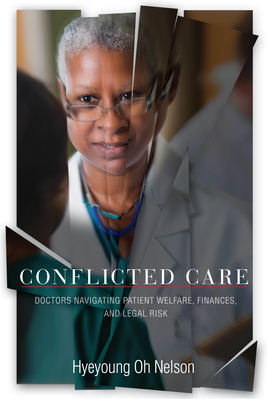Conflicted Care: Doctors Navigating Patient Welfare, Finances, and Legal Risk

Conflicted Care: Doctors Navigating Patient Welfare, Finances, and Legal Risk
An eye-opening and compelling ethnography about how doctors make decisions
The oath that doctors take to "do no harm" suggests that patient welfare is at the center of what it means to be a successful medical professional. It is also understood, however, that hospitals are not only vessels for medical care--they are businesses, educational institutions, and complex bureaucracies with intricate codes of etiquette that dictate how each staff member should approach situations with patients. In Conflicted Care, Hyeyoung Oh Nelson provides an in-depth look at the decision-making processes of physicians at a large, prestigious academic medical center--that she calls Pacific Medical Center--and finds that more often than not patient wellbeing is only one of several factors governing day-to-day decisions.
The steps physicians take reveal a kind of hidden curriculum of the medical world, one that is guided by status and hierarchy, bureaucracy, norms for consulting with third-parties, regulations for interactions with patients, and medical uncertainty. While at an institutional and individual level patient care continues to be integral to everything the physicians do, they are forced to reconcile that vow with these other, often-conflicting internal logics. Harm, Nelson argues, is thus built into the practice of medicine in the United States. This harm can take the form of unnecessary treatments and consultations or inadequate treatment for pain to motivate specialist intervention that would otherwise be resisted. These and other practices have the overall consequence of significantly driving up inpatient care costs, which then results in patients forgoing needed, ongoing treatment once they receive their medical bills.
Drawing on a deep ethnography of physicians in the Internal Medicine Service unit, Nelson offers a sharp assessment of current policies aimed at alleviating medical costs and explains why they are ineffective. She concludes by offering novel policy and practice recommendations for health care practitioners, policy makers, and healthcare institutions.
PRP: 174.45 Lei
Acesta este Prețul Recomandat de Producător. Prețul de vânzare al produsului este afișat mai jos.
157.00Lei
157.00Lei
174.45 LeiLivrare in 2-4 saptamani
Descrierea produsului
An eye-opening and compelling ethnography about how doctors make decisions
The oath that doctors take to "do no harm" suggests that patient welfare is at the center of what it means to be a successful medical professional. It is also understood, however, that hospitals are not only vessels for medical care--they are businesses, educational institutions, and complex bureaucracies with intricate codes of etiquette that dictate how each staff member should approach situations with patients. In Conflicted Care, Hyeyoung Oh Nelson provides an in-depth look at the decision-making processes of physicians at a large, prestigious academic medical center--that she calls Pacific Medical Center--and finds that more often than not patient wellbeing is only one of several factors governing day-to-day decisions.
The steps physicians take reveal a kind of hidden curriculum of the medical world, one that is guided by status and hierarchy, bureaucracy, norms for consulting with third-parties, regulations for interactions with patients, and medical uncertainty. While at an institutional and individual level patient care continues to be integral to everything the physicians do, they are forced to reconcile that vow with these other, often-conflicting internal logics. Harm, Nelson argues, is thus built into the practice of medicine in the United States. This harm can take the form of unnecessary treatments and consultations or inadequate treatment for pain to motivate specialist intervention that would otherwise be resisted. These and other practices have the overall consequence of significantly driving up inpatient care costs, which then results in patients forgoing needed, ongoing treatment once they receive their medical bills.
Drawing on a deep ethnography of physicians in the Internal Medicine Service unit, Nelson offers a sharp assessment of current policies aimed at alleviating medical costs and explains why they are ineffective. She concludes by offering novel policy and practice recommendations for health care practitioners, policy makers, and healthcare institutions.
Detaliile produsului











